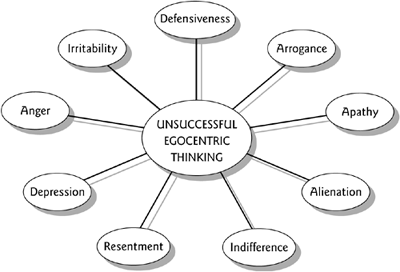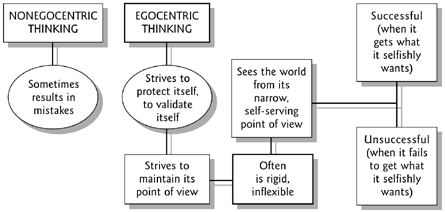Westside Toastmasters is located in Los Angeles and Santa Monica, California
"Unsuccessful" Egocentrism
When egocentric thought is unsuccessful, it creates problems not only for those influenced by the thinker but also for the thinker (Figure 10.3). Let's return to Max and Maxine and the movies for a moment. Imagine that for many months Max and Maxine go through this video-store routine in which, through self-serving argumentation, Max is able to manipulate Maxine into going along with his video choices. But one day Maxine decides that she simply isn't going along with Max's selfish behavior in choosing which movie to rent. She begins to feel resentment toward Max. She begins to think that perhaps Max isn't truly concerned about her. The more she thinks about it, the more she begins to see that Max is selfish in the relationship in a number of ways. Not only is he unwilling to go along with her movie choices, but he also tries to control where they go to lunch every day, when they eat lunch, when they visit with friends, and so on.
Figure 10.3. These are some of the many feelings that might accompany egocentric thinking. They often occur when egocentric thinking is "unsuccessful."

Maxine begins to feel manipulated and used by Max, and out of her resentment emerges a defensive attitude toward Max. She rebels. She no longer simply goes along with Max's unilateral decisions. She begins to tell him when she doesn't agree with his choices.
At this point, the table is turned for Max. His egocentric thinking is no longer working for him. He feels anger when he doesn't get his way. Because he lacks insight into his dysfunctional thinking, though, he doesn't realize that he is actually treating Maxine unfairly.
Because Maxine's resentment is now leading to acts of retaliation on her part, Max's life is less successful than it was. Maxine may end up deciding that she is not going to happily agree to Max's movie choices in the future. Her resentment may lead her to seek subtle ways to punish Max for his unfair treatment of her. If she does go along with his movie choices, she might sulk the entire time they are watching the movie. They may both become unhappy as a result of Maxine's rebellion and interrelate in a perpetual state of war, as it were.
This is merely one pattern in a myriad of possible patterns of egocentric thinking leading to personal or social failure. Egocentric thinking and its social equivalent, sociocentric thinking, can lead to social prejudice, social conflict, warfare, genocide, and a variety of forms of dehumanization. Though on occasion some person or group might be "successful" as a result of the ability to wield superior power, quite often the consequences will be highly negative for themselves, as well as their victims. Consider a gang that randomly chooses a person to harass who is wearing the same color sweatshirt that is its group "color." The members begin with verbal assaults, which quickly lead to physical attacks, which in turn result in serious injury to the victim. Consequently, the gang members responsible for the attack are arrested on suspicion, then found guilty of a serious crime, which leads to their imprisonment.
Even if it does not cause direct harm to others, egocentric thinking may lead to chronic self-pity or depression. When problems emerge, it is easy to revert to this type of thinking:
I don't know why I should always get the short end of the stick. Just when I think things are going well for me, I have to face another problem. Is there no end? Life seems to be nothing but one problem after another. My boss doesn't think I'm doing a good enough job. My wife is always complaining about something I do. My kids are always getting into trouble at school. And now I've got to figure out how to deal with this car. Life is just a pain in the neck. I don't know why things don't ever go my way.
Egocentric, self-pitying persons fail to recognize the positives in life. They screen these out in favor of self-pity. They inflict unnecessary suffering on themselves. They say to themselves, "I have a right to feel all the self-pity I want, given the conditions of my life." In situations such as this, because the mind is unable to correct itself, it is its own victim. It chooses to focus on the negative and engage in self-punitive behavior (Figure 10.4).
Figure 10.4. Problems in thinking can be either egocentrically or nonegocentrically based.

That is not all. Important moral implications follow from adult egocentrism and socio-centrism. Thinking that ignores the rights and needs of others will necessarily violate those rights and needs. Hence, for example, when humans are under the sway of highly sociocentric thinking, that thinking places the desires and aspirations of the group in a privileged position over other groups. One consequence resulting from such thinking is that the needs and desires of other groups are systematically ignored for the "in group" to justify getting its way. The double standards of the "in group" are camouflaged. To be sure, history is replete with examples of social groups imposing on other groups pain, suffering, and deprivation that they would object to if it were inflicted on them. The inconsistencies characteristic of hypocrisy easily avoid our notice when we are under the sway of socio-centrism.
Test the Idea |



